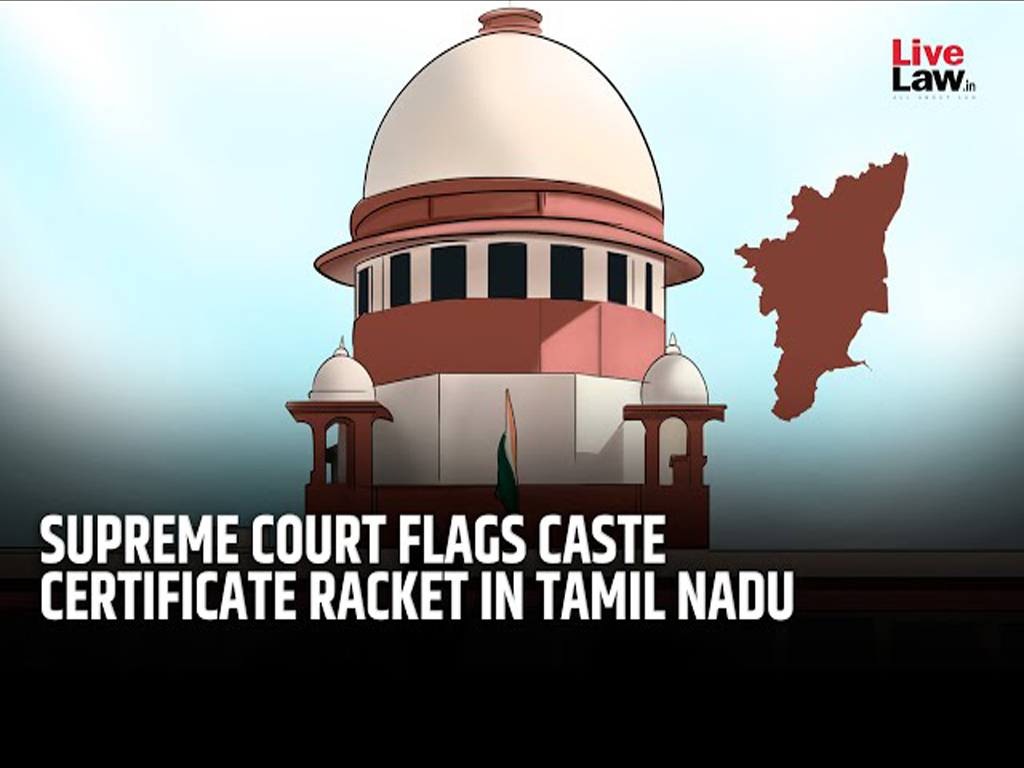Caste Certificate Fraud in Tamil Nadu: Supreme Court Raises Alarm Over Growing Racket
By Grien Law Chamber | April 12, 2025
The Supreme Court of India recently expressed serious concerns over the widespread racket involving caste certificate fraud in Tamil Nadu. The court highlighted the growing instances where individuals obtain fake caste certificates to avail benefits meant for marginalized communities. This issue has led to legal battles, administrative hurdles, and the exploitation of affirmative action policies. This case study examines the legal implications, challenges, and potential solutions concerning caste certificate fraud in Tamil Nadu.
Background of the Case
Caste-based reservations in India play a crucial role in ensuring social justice and equitable access to education, employment, and government benefits. However, fraudulent practices in obtaining caste certificates have undermined the intended purpose of these policies. The Supreme Court's recent observations have brought this issue to the forefront, questioning the efficacy of the current verification mechanisms and legal deterrents.
Key Issues Highlighted by the Supreme Court
- Widespread Forgery: The court noted that caste certificate fraud has become a well-organized racket, with individuals and syndicates forging documents to falsely claim Scheduled Caste (SC), Scheduled Tribe (ST), and Other Backward Class (OBC) status.
- Legal and Administrative Challenges: Authorities struggle to verify the authenticity of caste certificates, leading to prolonged litigation and loss of opportunities for genuinely deserving candidates.
- Impact on Reservation Policies: The misuse of caste certificates deprives rightful beneficiaries of education and employment opportunities, distorting the reservation system.
- Lack of Strict Enforcement: Despite laws against fraudulent caste certificates, enforcement remains weak, allowing culprits to exploit loopholes.
Legal Analysis
From a legal perspective, this case illustrates the tension between administrative discretion and judicial oversight. While executive authorities like the DDA have operational autonomy, they remain accountable to the judiciary when their actions (or inaction) contradict established legal principles or court directives.
The Court's decision to summon the Vice-Chairman directly reflects the application of the principle that contempt powers can be exercised when there is willful disobedience of court orders, particularly in matters affecting public interest.
Notable Legal Cases and Precedents
- Madhuri Patil v. Addl. Commissioner (1994): The Supreme Court laid down a detailed procedure for caste verification and invalidation of fraudulent caste certificates.
- Kumari Madhuri Patil & Anr vs Additional Commissioner, Tribal Development (1995): This ruling mandated the establishment of Scrutiny Committees for verification of caste certificates.
- Recent Tamil Nadu Cases: The state has witnessed multiple cases where individuals have secured jobs and admissions under false caste claims, leading to legal battles and dismissals from service.
Legal Framework and Penalties
Under Indian law, forging a caste certificate is a punishable offense. Key legal provisions include:
- The Indian Penal Code (IPC): Sections 420 (cheating), 465 (forgery), and 468 (forgery for purpose of cheating) apply to such cases.
- The Scheduled Castes and Scheduled Tribes (Prevention of Atrocities) Act, 1989: Provides legal recourse for individuals wrongfully deprived of their benefits.
- Tamil Nadu Government Orders: Various state-level regulations mandate strict verification procedures.
Suggested Reforms and Solutions
Strengthening Verification Mechanisms:- Implementing AI-based document verification systems.
- Digitalizing caste records to prevent forgery.
- Imposing severe penalties on those found guilty of caste certificate fraud.
- Conducting periodic audits to detect and eliminate fraudulent cases.
- Educating citizens about the legal consequences of submitting fake caste certificates.
- Encouraging whistleblowers to report fraudulent practices.
Conclusion
The Supreme Court’s concerns highlight the urgent need for systemic reforms to tackle caste certificate fraud in Tamil Nadu. Strengthening verification processes, enforcing strict penalties, and increasing public awareness can help curb this malpractice. Legal professionals, policymakers, and citizens must work together to uphold the integrity of the reservation system and ensure that benefits reach the rightful beneficiaries.
For legal assistance on caste certificate verification, fraud cases, or any related legal matters, contact *Grien Law Chamber* for expert legal guidance.
About Grien Law Chamber
Grien Law Chamber is a full-service law firm based in Chennai with expertise across diverse legal disciplines including constitutional law, property law, urban development, and administrative law. Our team of specialized advocates brings decades of combined experience in handling complex litigation and advisory matters at all levels of the Indian judicial system.
Disclaimer: This blog post is for informational purposes only and does not constitute legal advice. For specific legal guidance, please consult with a qualified Advocate.

